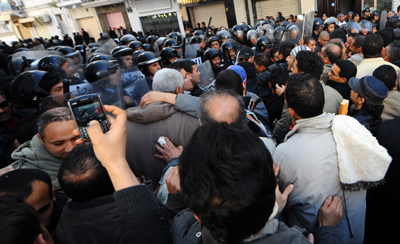Attacks on the Press 2010: Middle East and North Africa Analysis
Suppression Under the Cover of National Security By Mohamed Abdel Dayem Relying on an extensive network of sources in the military, government, and Islamist groups, Yemeni freelance journalist Abdulelah Shaea had become a frequent and pointed critic of the administration’s counterterrorism efforts. By July, President Ali Abdullah Saleh’s government had enough, dispatching security agents to…
Attacks on the Press 2010: Tunisia
Top Developments • Targeting journalists, government criminalizes contact with foreign organizations. • Private broadcast licenses are controlled by Ben Ali’s family and friends. Key Statistic 5: Years of imprisonment for violations of new law barring contact with foreign groups. Tunisia remained one of the region’s most repressive nations even as it sought to project an…
Tunisian TV station’s suspension reflects tenuous freedom
On Sunday, the privately owned broadcaster Hannibal TV was forced off the air for more than three hours. The state-owned news agency Agence Tunis Afrique Presse (TAP) issued a statement stating that an arrest warrant had been issued for the station’s owner on charges of “high treason” for an alleged “plot to destabilize national security.”…
Will Tunisia’s ‘Internet revolution’ endure?
There has been a great deal written online about how much of a positive role the Internet played in recent events in Tunisia (if you’d like to catch up, Alex Howard’s link round-up provides a good summary of the many sides, both for and against). At CPJ, our focus is on slightly different questions: How…
Freed! Fahem Boukadous released in Tunisia
For those who have spent countless hours exposing and combating Tunisia’s vast press freedom abuses, today is truly a glorious day. Tunisian authorities released the ailing imprisoned journalist Fahem Boukadous, a day after CPJ called on the transitional government to honor its pledge to free all political prisoners. Today, we can loudly proclaim that no…
Internet censorship halts in Tunisia
So much has happened in Tunisia since I last blogged on the large-scale phishing attacks against activists and journalists in the country. With the fall of Zine El Abidine Ben Ali, and a new interim government in place, online censorship seems to be ending. Opposition media and human rights sites are viewable, and CPJ’s Tunisia…

In Tunisia, one journalist still jailed, another killed
New York, January 18, 2011–Tunisia’s transitional government should immediately release Fahem Boukadous, a television reporter imprisoned last year in reprisal for his work, the Committee to Protect Journalists said today. CPJ also offered condolences to the family and colleagues of French photographer Lucas Mebrouk Dolega, who died of head injuries suffered while covering the civil…
As Ben Ali’s regime falls, 3 Tunisian journalists freed
New York, January 14, 2011–The Committee to Protect Journalists is heartened by news reports that three jailed Tunisian journalists have been freed as the repressive regime of Zine El Abidine Ben Ali has fallen. CPJ calls on the new interim Tunisian government to release one other journalist believed to be still in custody.
Tunisia must end crackdown on media
New York, January 12, 2010–Tunisian authorities must end their weeks-long crackdown on bloggers and reporters covering street protests, the Committee to Protect Journalists said today. Scores of journalists have been detained in the past four weeks, three of whom remain in custody. Local and international reporters have faced continued harassment, including detention, restrictions on movement,…

Tunisia invades, censors Facebook, other accounts
The Tunisian government has been a notorious censor for many years, for journalists online and off. In the wake of widespread domestic protests in December, however, the authorities appear to have turned to even more repressive tactics to silence reporting. In the case of Internet bloggers, this includes what seems a remarkably invasive and technically…